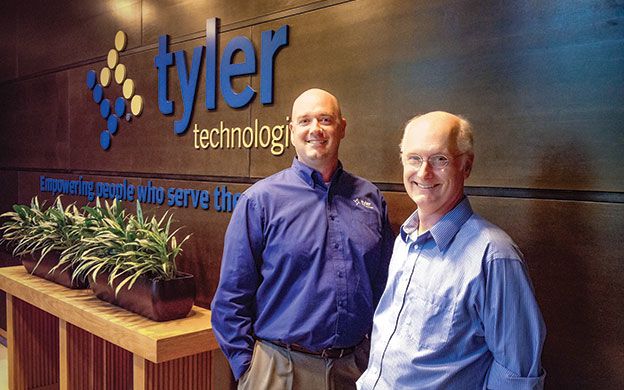Tyler Technologies sponsors app contest to promote IT careers for Maine's youth
 Photo / James McCarthy
Ray Arbour, a project manager at Tyler Technologies in Yarmouth, and Jay Collier, program director of Project>Login, encourage Maine high school students to consider IT careers.
Photo / James McCarthy
Ray Arbour, a project manager at Tyler Technologies in Yarmouth, and Jay Collier, program director of Project>Login, encourage Maine high school students to consider IT careers.
Ray Arbour, a project manager at Tyler Technologies, and Jay Collier, Project>Login's program director, know there are career opportunities in computing and information technology fields for Maine's youth: More than 1,100 software development openings were posted last year in Portland alone.
Tyler Technologies Inc., a Plano, Texas-based public sector software developer with 540 employees at three locations in Maine, recently announced plans to expand its Yarmouth office building and add more than 500 employees there over the next 10 years. The unanswered question: Will Maine deliver the talent it needs to fill those jobs?
Like WEX, IDEXX and other Maine technology companies, Tyler takes a proactive approach to make sure it has the skilled computing and IT professionals it needs to continue meeting the needs of its public sector clients. In addition to offering paid internships, the company is sponsoring the Maine App Challenge in a partnership with Educate Maine and Project>Login. The new competition for Maine high school students offers $10,000 in scholarships to be awarded to the top finalists: a $6,000 first prize, $3,000 second prize and $1,000 third prize. Deadline for submissions is Oct. 16; winners will be announced at the Maine Digital Festival on Dec. 12.
Mainebiz recently met Ray Arbour, Tyler's project leader for the app challenge, and Jay Collier, Project>Login's program director, and Gia Davis, director of marketing for Tyler Technologies, to talk about that initiative. The edited transcript follows.
Mainebiz: How does the Maine App Challenge relate to the need of Maine businesses like Tyler Technologies for workers with strong computer and IT skills?
Ray Arbour: Our focus and Project>Login's mission is to get students who live in Maine excited about this field of work and to go to college and then stay here when they're done. We want them to know that there are jobs here for people with these interests. A great way of doing that is to create a contest and get people excited about competing against each other.
MB: How does the app challenge work?
RA: Basically, the idea is simple: You create an application that addresses a need or problem in your community. We’ve actually got three different components to our challenge: A documentation and design component; a video presentation; and an application component that includes two versions of the app that was developed: one that’s ready to go and can be loaded onto any android device and the other as a project file that our judges can load into MIT App Inventor 2, allowing them to evaluate the actual code structure.
We want students to concentrate not only on the ‘hard’ skills of actually being able to create a program, but also the ‘soft’ skills you need to sell and market it. We’re not only hiring developers here. We’re going to be hiring implementation people, we’re going to be hiring salespeople — we’re going to be hiring a lot of people here. So if you’re technically inclined, or even just have an interest in technology, there’s going to be a spot for you here at this company.
Jay Collier: In addition to the jobs in development, these are skills that center around critical thinking, problem-solving and service. So a good piece of this is identifying a problem and identifying who is having that problem and then solving it. It also involves using the logical steps to find out what tools will help them and to make sure that it works. So all of what we’re doing with Project>Login, as well as this app challenge, is to help students gain those kinds of broader skills that are in demand and which, we’ve found from research, are essential across a majority of jobs. The critical-thinking and problem-solving skills are really at the heart of those jobs.
MB: What kinds of app 'solutions' are you looking for?
JC: I'll give you an idea that probably somebody could steal: There was a team at one school that was concerned about bullying at their urban school. So they created an app that when the student pressed the button, several things would happen. 1.) Their phone would ring, because they had seen research indicating that when your phone rings, it stops somebody from bullying you. 2.) It also automatically sent a call or text to a predetermined person who could help them. And all of that could happen when the phone was in their pocket. So they started with a real problem and, with doing some research, they came up with something that was meaningful and would really help people.
MB: How are you getting the word out about this app challenge?
Gia Davis: We have communication and media plan that we are trying to get the word out through all of our local media. I’ve been working with Jay and Meghan to provide updates about the app challenge through Project>Login posts and feeds that they have available. We have reached out to about 200 Maine clients of Tyler Technologies in our municipal and school markets, to share the program with them. I know Ray’s team has reached out to some of robotics groups that they work with and some of the camps and schools they have relationships with. And we continue every day and every week to come up with new ways of getting the word out.
We also have a web page at www.tylertech.com/maineappchallenge with details about the program.
MB: The deadline for submitting an app?
RA: Oct. 14.
MB: Is that enough time for the students to develop an app?
RA: This is not something that we’re anticipating students will be using classroom time to work on. So they could work on it after school, or during their own time. We’re not in any way suggesting or restricting them to work on this during school time. This is meant to be something they do on their own. They can work with a mentor, if they want to. But it’s meant to be something that students are taking on out of their own interest in the subject. It’s not something we’re expecting they’ll wait until they’re back in school to start working on.
It doesn’t require a significant amount of knowledge going in. The tool that we use, MIT App Inventor 2, is a block-spaced drag and drop program. You don’t even need code. You can get started very quickly with it.
MB: So the emphasis, really, is on ‘ideas.’
RA: Yes. The emphasis is on developing an idea, following through with it and seeing where it takes you. That’s a big part of this problem-solving and development flow: What’s the real ‘meat’ of the matter? What’s the real thing you need to get to in order to be successful? It’s not always the first thing you think of. You may find as you go along that there’s something else that’s really more pressing. We encourage that.
We want to see the wheels turning. We want to see the thought that goes into it and the excitement that students have for the process as well as the end product.
MB: How will you judge the app submissions?
RA: Our team is going to review all of the submissions and then come up with some finalists. Once we have narrowed the field to a group of finalists we’re going to produce a judging packet for each finalist that will go to our five judges. That packet is going to include the app itself; it’s going to be uploaded onto an android device. It’s going to include the documentation that’s submitted, the video presentation, and we’re going to ask the judges to score according to the rubric that’s available on our website.
Once we have tallied those submissions according to the competition’s rubrics, we’ll notify the 1st, 2nd and 3rd place winners. We’ll notify all the finalists to let them know where they stand.
MB: Will the winners be announced at a public event?
JC: We’ll be announcing the winners for the first annual app challenge on Dec. 12 at the Maine Digital Festival, which is held on the same day at the Augusta Civic Center as the Maine Robotics Challenge. There will be 2,000 people there and at the same time there’s also a high school robotics challenge called ‘VEX.’ So we’ve been working to make it a big day and take over the whole civic center. So there’s an opportunity for awareness to happen within all those activities that are happening there that day.
MB: What happens to these great app ideas that you've just awarded prizes to?
RA: Whatever the student wants. They own it. We're not taking ownership of it, we're not taking responsibility for it, we just want to see it and we want to know what it does. We're not going to turn it into some money-making app here for Tyler or any of other subsidiaries. We leave it completely in the hands of the developer.
MB: But that winning app team, probably because they’ve won a prize, has a good indication they might be onto something. So if they haven’t tapped an entrepreneurial friend at their school, they might want to reach out and ask that person to help them sell it.
RA: Exactly. The three prizes are scholarship money so you can’t promote your app with that money, or do anything else with it. But it’s definitely something that should pique their interest in understanding the potential for their apps.
MB: How does this app challenge fit into the bigger picture of Tyler having a need for skilled computer and IT workers?
GD: Tyler, obviously, has people working here from a variety of areas. But many of us are local: We grew up here, we love Maine. And we’ve found that this is a company that employs many great strong individuals. So we’re looking to promote that with our Maine high school students. We really want to let them know that we’re here. Not only us: WEX is here and all these other companies. We don’t want high school students to think that when they go away to school they’ll have to work out of state in a major city to develop their career ambitions.
JC: We all recognize there are students who will want to leave Maine for college and/or for work. But there are a number of students who want to stay and don’t know how to stay.
Here’s one of the best stories I know: One of our partners has an employee who went to school here in Maine and said, ‘There’s a river I know. I’m a fly fisherman and that river is really important to me. It’s part of my free time. I want to stay here, to be able to have those roots.’ So, now he’s a project manager for one of our companies here in Maine.
So, for students who do have roots here in Maine, or who really want to come back, we really want them to know there are these opportunities.
MB: Will this be an annual event?
RA: I don’t think officially we’ve decided whether this will be an annual event. But we have been calling it the ‘first annual Maine App Challenge,’ so I think we’re planning to do this in the years to come.
Editor's note: This story has been updated. It is a longer version of the On The Record interview appearing in our Aug. 10 print edition, which also was published online on that date.
Read more
Tyler Technologies looks to nearly double jobs with Yarmouth expansion










Comments